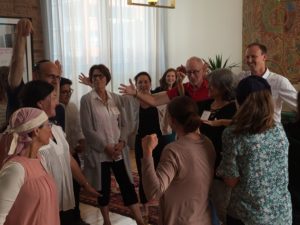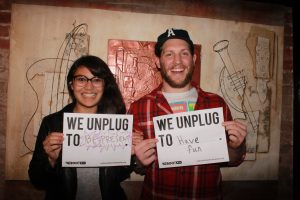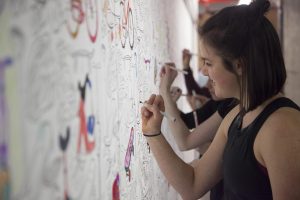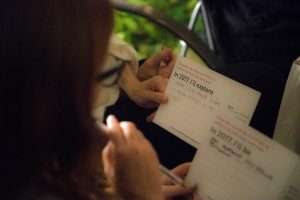The Foundation is pleased to share reflections from participants at its recent convening of directors of Jewish educator training programs.
Pulling up to The Publishing House Bed and Breakfast in what appeared to be an old, deserted part of Chicago’s near West Side did not particularly allay my trepidation about the upcoming couple of days with my fellow grantees of the Jim Joseph Foundation’s Professional Development Initiative (PDI). I walked around the building trying to figure out how to enter, eventually found the B & B’s small door and went inside. No one was in the small foyer to greet me and it took me a while to determine that I needed to call someone’s cell phone who would then come to take care of check-in. As I waited, I couldn’t help but wonder what I had gotten myself into – an inauspicious beginning to be sure.
And then I met the inn keeper and climbed the stairs into a magnificent, refurbished space that embodied the elegance and beauty of 110 years ago while reflecting the comforts and innovations of 2018. I soon learned (and experienced for myself) that the near West Side of Chicago is far from deserted. Rather, it is a quickly growing hotspot for Gen Z and Millennials, with housing construction on every street, restaurants, fragrant coffee shops and more.
These initial impressions of The Publishing House are a fitting metaphor for the experience we shared. The ten PDI project directors represented a broadly diverse group, both in terms of settings served, roles and ages. When considered individually each one of these characteristics opens up a world of difference between the participants, whether it be in how we work, our independence within our respective organizations and our generational experience of the world around us. Taken together, they might have led to an insurmountable stumbling block.
Thanks to outstanding framing by the event organizers from Rosov Consulting, early on in the proceedings I began to understand the import and power of the experience, both in building relationships with colleagues who are engaged in the same, yet different, work and in gaining insight into the nature of the field of Jewish education in 2018. These two pieces are inextricably connected: the directors of the ten PDI projects are playing an important role in shaping the field in the image of their vision and aspirations for Jewish learning in our time and in the future.
As someone well into the second half of my career, I spend a great deal of time considering how the field is changing in response to our changing world and how I can best leverage my experience in service of the future (much like The Publishing House has seamlessly woven the past into the present and future). Indeed, I often wonder how I might gain more understanding of and insight into the realities and dreams of the next generation. And so, the gift of two days with colleagues from multiple generations and settings, allowed me (and all of us) to more deeply understand each other’s realities and the contours of the field of Jewish education as it is emerging.
During the gathering, four project directors (myself included) presented their projects. The presentations by Laynie Solomon of Svara: A Traditionally Radical Yeshiva and Dr. Josh Lambert of the Yiddish Book Center’s project crystalized in my mind the dramatic generational shifts in the field and the power of the learning and dialogue we were experiencing. The PDI/Svara project seeks to raise up a generation of teachers who are “bold and courageous teachers, transformers, and transmitters of Jewish tradition.” while the Yiddish Book Center’s Great Books project uses 2018 technological capacities to bring literature of a very different time and place to a new generation of middle and high school teachers in Jewish day schools. Robbie Gringras of Makom brought into focus in a particularly profound way the joys and challenges of marrying the ongoing work of Israel education with the world of Moishe House, serving young people in their 20’s. Perhaps more than any project, Robbie is charged with adapting and shifting not only the nature of the learning to meet the needs of this age group but also the expectations of the fluid and often unpredictable engagement that typifies Millennials and Gen X.
As the director of HUC-JIR’s Executive MA program in Jewish education, a hybrid online/face-to-face learning experience for Jewish educators working in all aspects of the field, I, along with my HUC-JIR colleagues, am continuously trying to understand the evolving nature of the field, the people whom we educate and the leaders we prepare. As I listened to and experienced the work of my colleagues and engaged in sustained conversations with other project directors not mentioned here, I felt a profound shift in my grasp of the world Jewish educators and learners inhabit today and will inhabit in the years ahead. During the time of the gathering, our current HUC-JIR Executive MA students were beginning a sequence of courses entitled Educational Practices. The sequence begins by asking students to delve into the question of “who are our learners.” The next set of questions they will be addressing ask, “What matters to our learners?” and “What does learning look like today?” The PDI gathering in Chicago, without question, brought home for me just how dramatically our field is changing and the consequent demands made upon current and future leaders to respond to these changes while remaining firmly rooted in an ancient tradition and the successes of our past which in turn will have an impact on the content and framing of the course sequence.
In the years ahead, as Jim Joseph Foundation PDI program directors continue to collaborate and learn from one another, and as the world around us continues to change at what some would say is a breakneck pace, my hope is that we will not only understand but also be able to articulate with greater clarity the nature and concrete work entailed in ensuring a vibrant and ever-evolving field of Jewish education
Dr. Lesley Litman is the Director of the Executive MA program in Jewish Education at Hebrew Union College – Jewish Institute of Religion

 Boulder and Denver early learning educators from our Jewish Early Childhood Education (ECE) centers are sharing their talents and increasing their knowledge through a new Cross Community Learning Exchange to elevate the importance of Jewish ECE. Ten local ECE educators are taking part in a peer learning cohort with ten ECE educators from the Greater Chicago area to strengthen their teaching skills. The group met in Boulder in early April and will meet in Chicago later this year. Monthly virtual meetings will take place in between.
Boulder and Denver early learning educators from our Jewish Early Childhood Education (ECE) centers are sharing their talents and increasing their knowledge through a new Cross Community Learning Exchange to elevate the importance of Jewish ECE. Ten local ECE educators are taking part in a peer learning cohort with ten ECE educators from the Greater Chicago area to strengthen their teaching skills. The group met in Boulder in early April and will meet in Chicago later this year. Monthly virtual meetings will take place in between.








